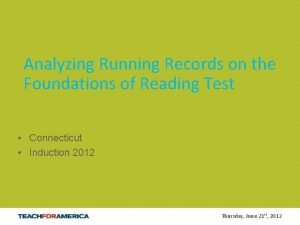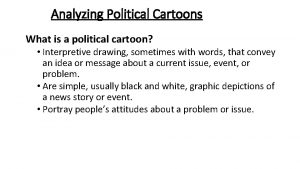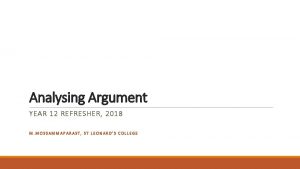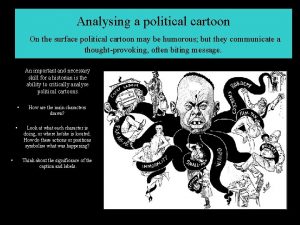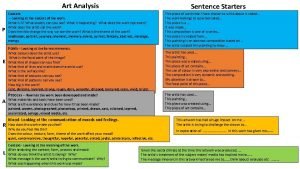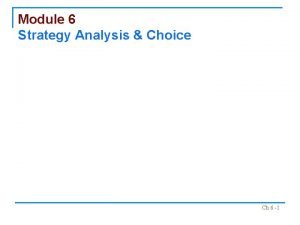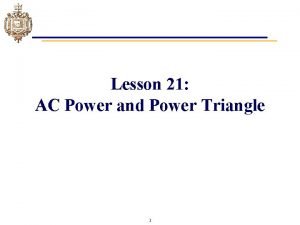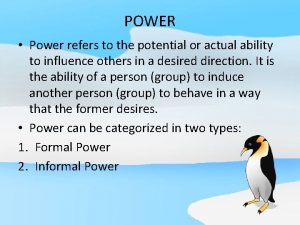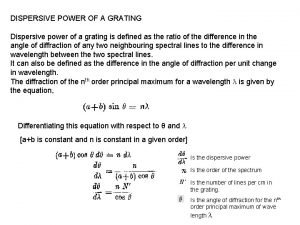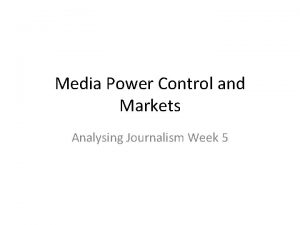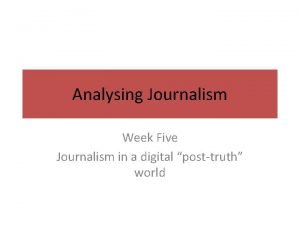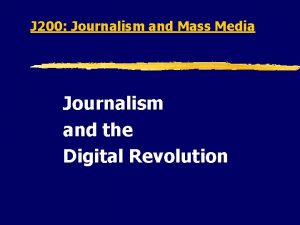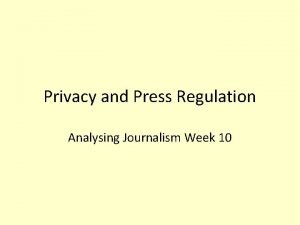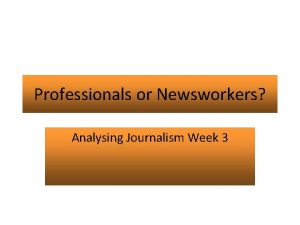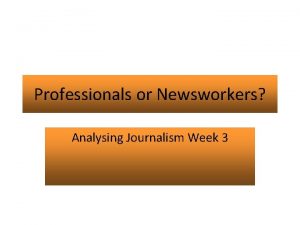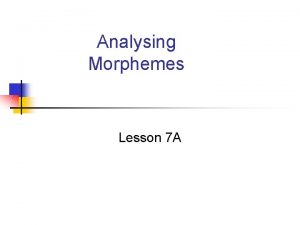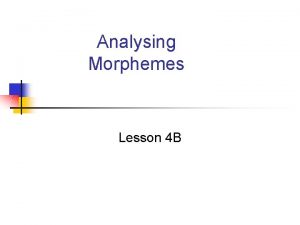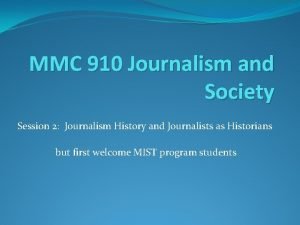Media Power Control and Markets Analysing Journalism Week

























- Slides: 25

Media Power Control and Markets Analysing Journalism Week 4

Aims • To look at structures of control in media • To consider the relationship between media and markets • To look at evidence of recruitment into media elites

Free Theory • Free Market Theory • Delivers media resources most efficiently • Guarantees the free circulation of ideas • Allows enterprise to flourish • State regulation seen as threat to enterprise I love it!

Pluralism • Liberal democratic societies should be pluralistic with multiple centres of power • Most media should be delivered in free market • The state is a potential threat to media freedom but some regulation required to curb market excess • European Pluralists now see Public Sector Broadcasting as needing protection Gillian Doyle

“Media pluralism should be understood as diversity of media supply reflected, for example, in the existence of a plurality of independent and autonomous media and a diversity of media content available to the public. ” (2002: 12)

Political economy approaches • Origins in Marx’s analysis of capitalism • Markets will always tend towards concentration of ownership • Interests of media elites and business elites interlinked Peter Golding • Media contribute to the reproduction of wider social and economic inequalities • In some circumstances state regulation has to be used to curb the power of conglomerates

Feminist Theories • Different strands of feminist theory employ different models of power • Liberal Feminism - Instrumental model of power: power working through choices people make (editors, owners, etc. ) ? • Radical feminism - Structural model of power: power working through social structures (economic, political, ideological) ? • What happens when women reach the top?

“… the day to day culture of most newsrooms is still being defined in predominantly male terms. Whilst there has been a dramatic increase in the number of women securing jobs in journalism, white middle class men continue to occupy the vast majority of positions of power throughout the sector. ” Cynthia Carter ‘News Gender and Power’ 1998: 2

The Evidence • Evidence from the main features of the media landscape in the UK • What are the key patterns in terms of ownership, control and media elite recruitment?

Concentration of Ownership in news making • Historic decline in number of UK newspapers – e. g. 1900 – 9 evening papers in London, now just Evening Standard • Brief ‘growth spurt’ in late 1980 s – 6 new papers but now only 1 has survived – The Independent.

News Circulation (2014) News Group Circulation News International Mirror Trinity 7, 990, 508 % of total daily and Sunday 39. 01% 3, 148, 524 15. 4. % Associated (Mail etc) Express Newspapers 4, 185, 428 20. 4% 2, 263, 909 11. 0%

Broadcasting • Contrasting Trends: 17 ITV franchises now merged into one since 1990 But growth in rolling broadcast news (Sky, Fox, CNN, BBC 24, etc. ) Growth in local commercial radio now reversed – contraction and concentration http: //www. mediauk. com/owners/151/ tindle-radio Win FM replaced by Dream replaced by Hampshire FM – replaced by nothing What about local news?

The World Wide Web • Huge diversity • But signs of concentration and corporate interests beginning to dominate • Google buys You Tube • News Corp buys My. Space • Facebook now a PLC worth $27 billion • Microsoft buys NBC

Patterns of Concentration • Vertical • Horizontal e. g. Richard Desmond ‘Northern and Shell’ parent company own newspapers – papers, magazines, printers, Fantasy Channel, etc. Check out News Corporation as a bigger example • News Corp and Murdoch Global Interests

Why Concentration? Greater synergies can be achieved: • Economies of scale e. g. Desmond insists on same horoscope in all his papers • Cutting costs e. g. legal teams, marketing, etc. • Cross-subsidies e. g. profits from Sky used to fund Times price war

Why Concentration? • Co-promotion e. g. authors published by Harper Collins give serialisation rights to News International papers and TV. e. g. Rebecca Loos and Beckam • Maximise control and minimise risk

Implications • Powerful secure their position as start up costs disadvantage potential new entrants to news markets • News organisations grow more dependent upon advertising revenues with implications for editorial and format strategies e. g. lifestyle sections, motoring supplements, special features on food, etc.

Implications “Without his newspaper he is just an ordinary millionaire. With it he can knock on the door of Number Ten any day he pleases”. Financial Times comment on Rupert Murdoch e. g. News International newspapers and the BBC

Proprietors • Daily Mail and Mail on Sunday • The Rothermere family “the minor misdeeds of individual Nazis must be allowed to submerge the benefits that the new regime is already bestowing on Germany” Lord Rothermere 1933

Proprietors • Sunday and Daily Telegraph • Jersey tax exiles • Daily and Sunday Express • Daily Star • Richard Desmond

Are media elites representative? • Another key issue: are senior journalists drawn from all walks of life or a narrow strata of society? • Class, gender and ethnicity Paul Dacre editor of the Daily Mail earned. . . £ 2. 4 million (up 25%) in 2014

Are media elites representative? • Recent research commissioned by the Sutton Trust ‘The Educational Background of Leading Journalists’, June, 2006. • Now updated: ‘Leading People’ Sutton Trust (2016) • http: www. suttontrust. com (now on Learning Network) • Over 50% of national news editors, columnists, senior journalists and broadcast news presenters educated privately • 45% went to Oxbridge • Only 14% attended Comprehensive Schools • NB. Private schools account for 7% of the school population

Gendered News? • • Recent Women in Journalism Report (2012) Content analysis of national newspapers 78% front page stories written by men Seen But Not Heard (Women in Journalism Report)

Are media elites representative? • Thurman (2016): UK journalism 94% white • See Survey details • Diversity policies in broadcasting organisations only working slowly e. g. BBC 8% recruited from ethnic minorities, ITV 3. 7%, Channel Four 9. 4% (source Manning 2001: 73) • Have things changed subsequently?

Summary • Concentration in news markets • Signs of concentration emerging in new media • Senior journalists recruited from male and elite backgrounds • But new media provide multiple horizontal as well as vertical lines of communication • Whether the present alignment of old and new media serves society depends upon your theory!
 Conventional journalism
Conventional journalism Literary journalism vs traditional journalism
Literary journalism vs traditional journalism Inquiring and analysing
Inquiring and analysing Analyzing running records
Analyzing running records Exaggeration in political cartoons
Exaggeration in political cartoons Argument analysis structure
Argument analysis structure How do consumers respond to various marketing efforts
How do consumers respond to various marketing efforts The chinese pest cartoon
The chinese pest cartoon Methods of analysis character
Methods of analysis character Input stage in strategic management
Input stage in strategic management Sentence starters for art analysis
Sentence starters for art analysis Analysis of business transactions
Analysis of business transactions Strategy analysis and choice largely involves making
Strategy analysis and choice largely involves making Analysing argument
Analysing argument Analysing the 6 strategic options megxit
Analysing the 6 strategic options megxit Analysing market data
Analysing market data Week by week plans for documenting children's development
Week by week plans for documenting children's development Power trianlge
Power trianlge Opportunities and challenges in media information
Opportunities and challenges in media information Venn diagram of people as media and people in media
Venn diagram of people as media and people in media Solar power satellites and microwave power transmission
Solar power satellites and microwave power transmission Actual power and potential power
Actual power and potential power Plane transmission grating is
Plane transmission grating is Healthy vs unhealthy relationships
Healthy vs unhealthy relationships Tapestri inc
Tapestri inc Power control and drives
Power control and drives



